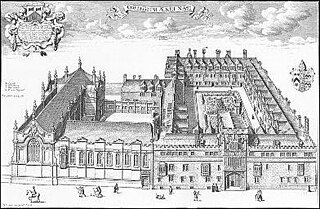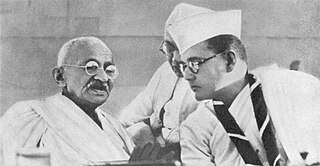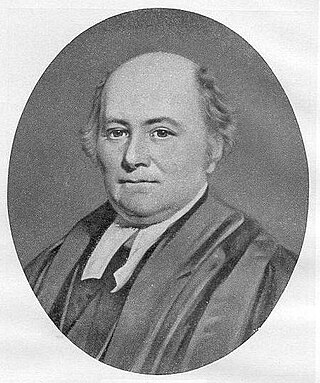Related Research Articles

Mohandas Karamchand Gandhi was an Indian lawyer, anti-colonial nationalist and political ethicist famous for his nonviolent resistance. He led the successful campaign for India's independence from British rule, and later inspired movements for civil rights and freedom across the world. The honorific Mahātmā, first applied to him in 1914 in South Africa, is now used throughout the world.

The University of Oxford has thirty-nine colleges, and five permanent private halls (PPHs) of religious foundation. Colleges and PPHs are autonomous self-governing corporations within the university. These colleges are not only houses of residence, but have substantial responsibility for teaching undergraduate students. Generally tutorials and classes are the responsibility of colleges, while lectures, examinations, laboratories, and the central library are run by the university. Students normally have most of their tutorials in their own college, but often have a couple of modules taught at other colleges or even at faculties and departments. Most colleges take both graduates and undergraduates, but several are for graduates only.

The Salt March, also known as the Salt Satyagraha, Dandi March and the Dandi Satyagraha, was an act of nonviolent civil disobedience in colonial India led by Mahatma Gandhi. The twenty-four day march lasted from 12 March to 5 April 1930 as a direct action campaign of tax resistance and nonviolent protest against the British salt monopoly. Another reason for this march was that the Civil Disobedience Movement needed a strong inauguration that would inspire more people to follow Gandhi's example. Gandhi started this march with 78 of his trusted volunteers. The march spanned 387 kilometres (240 mi), from Sabarmati Ashram to Dandi, which was called Navsari at that time. Growing numbers of Indians joined them along the way. When Gandhi broke the British Raj salt laws at 8:30 am on 6 April 1930, it sparked large scale acts of civil disobedience against the salt laws by millions of Indians.
The Vinerian Scholarship is a scholarship given to the University of Oxford student who "gives the best performance in the examination for the degree of Bachelor of Civil Law". Currently, £2,500 is given to the winner of the scholarship, with an additional £950 awarded at the examiners' discretion to a proxime accessit (runner-up).
Stanley Wolpert was an American historian, Indologist, and author on the political and intellectual history of modern India and Pakistan and wrote fiction and nonfiction books on the topics. He taught at the University of California, Los Angeles (UCLA) from 1959 to 2002.
Jonathan Francis Bennett is a philosopher of language and metaphysics, specialist of Kant's philosophy and a historian of early modern philosophy. He has New Zealand citizenship by birth and has since acquired UK and Canadian citizenship.

Christopher Maude Chavasse, was a British athlete, soldier and religious leader from the Chavasse family. He competed at the 1908 Summer Olympics in London, served in the First World War and was later the Bishop of Rochester.

Abbas Tyabji was an Indian freedom fighter from Gujarat, and an associate of Mahatma Gandhi. He also served as the Chief Justice of Baroda State. His grandson is historian Irfan Habib.

Subhas Chandra Bose 's political views were in support of complete freedom for India with a classless society and state socialism at the earliest, whereas most of the Congress Committee wanted it in phases, through a Dominion status.

Robin Ward is a British Anglican priest. Since 2006, he has served as principal of St Stephen's House, Oxford, an Anglo-Catholic theological college in England.

Leela Gandhi is an Indian-born literary and cultural theorist who is noted for her work in postcolonial theory. She is currently the John Hawkes Professor of Humanities and English and director of the Pembroke Center for Teaching and Research on Women at Brown University.
Archibald Ronald McDonald Gordon was a British Anglican bishop. He was the Bishop of Portsmouth from 1975 to 1984. He was the Bishop at Lambeth from 1984 and, additionally, the Bishop to the Forces from 1985. He ended his career as sub-dean at Christ Church, Oxford, from 1991 to 1996.

After the Indian Rebellion of 1857, the British Government took over the administration to establish the British Raj. The British Raj was the period of British rule on the Indian subcontinent between 1757 and 1947, for around 200 years of British occupation. The system of governance was instituted in 1858 when the rule of the East India Company was transferred to the Crown in the person of Queen Victoria.

The Gaisford Prize is a prize in the University of Oxford, founded in 1855 in memory of Dr Thomas Gaisford (1779–1855). For most of its history, the prize was awarded for Classical Greek Verse and Prose. The prizes now include the Gaisford Essay Prize and the Gaisford Dissertation Prize.

The Oxford University Polo Club is the Discretionary Full Blue sports club for competitive polo at Oxford University. Founded in 1874, it is one of the four oldest continuing polo clubs worldwide. Its annual Varsity Match against Cambridge University Polo Club, established in 1878, is the second oldest continuing polo fixture in the Western world. It is played at Guards Polo Club, England, usually at the beginning of June.
Lesley Jane Abrams, is a retired academic historian. She was a Colyer-Ferguson Fellow of Balliol College, Oxford, between 2000 and 2016, and Professor of Early Medieval History at the University of Oxford from 2015 to 2016.
Judith Diane Maltby is an American-born Anglican priest and historian, who specialises in post-Reformation church history and the history of early modern Britain. She has been the chaplain and a Fellow of Corpus Christi College, Oxford, since 1993, and reader in church history at the University of Oxford since 2004.
References
- 1 2 "Professor Judith Brown". University of Oxford . Retrieved 19 September 2013.
- ↑ "Raleigh Lectures on History". The British Academy. text audio
- ↑ "Birthdays". The Guardian . p. 35.
- ↑ "Judith Brown". Balliol College, Oxford. Archived from the original on 21 September 2013. Retrieved 19 September 2013.
- 1 2 "People: Associate Priest; The Revd Professor Judith M. Brown". St Mary Magdalen Church Oxford. Retrieved 25 September 2022.
- 1 2 3 "Judith Margaret Brown" . Crockford's Clerical Directory (online ed.). Church House Publishing . Retrieved 25 September 2022.
- ↑ "Brasenose Appoints our first female Chaplain". Brasenose College. University of Oxford. 2016. Retrieved 25 September 2022.
- ↑ Baker, Christopher (1977). "Review of Gandhi and Civil Disobedience: the Mahatma in Indian politics 1928–34 by Judith M. Brown". Modern Asian Studies. 11 (3): 469–473. doi:10.1017/S0026749X00014232. ISSN 0026-749X. S2CID 145133071.